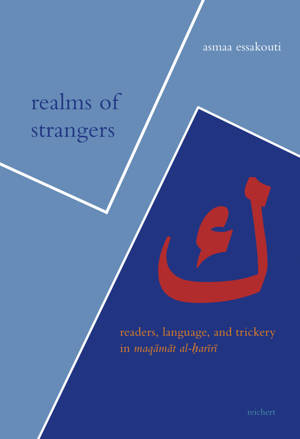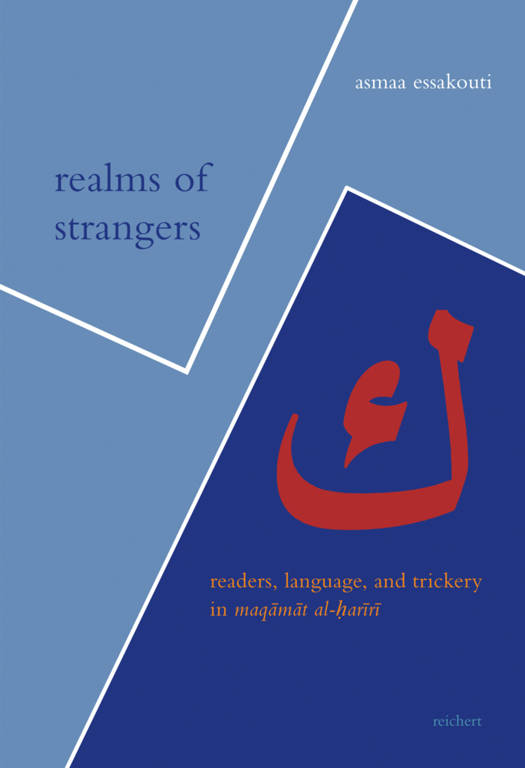
- Retrait gratuit dans votre magasin Club
- 7.000.000 titres dans notre catalogue
- Payer en toute sécurité
- Toujours un magasin près de chez vous
- Retrait gratuit dans votre magasin Club
- 7.000.000 titres dans notre catalogue
- Payer en toute sécurité
- Toujours un magasin près de chez vous
Realms of Strangers: Readers, Language, and Trickery in Maqamat al-Hariri
Asmaa Essakouti
72,95 €
+ 145 points
Description
This is a book about strangeness and strangers in the Maqamat of Hariri, an Arabic compendium of literary fiction from the 6th/12th century, featuring in fifty episodic narratives an intellectual pursuing a trickster to collect his rare words, sophisticated compositions, and curious accounts. Strangeness is a key element of the maqama genre. Al-Hariri accentuates this element and employs it in two different aspects of his maqamat: the vocabulary, and the trickster's relationship to space. The first aspect of unusual vocabulary combines Bedouin terms, curses, argot, and jargon, which Arabic lexicography categorizes as gharib: "strange" or "rare." The second manifests in the relationship of human experience with space: moving from one location to another, being in isolation or exile, away from home and familiarity, trading curiosities, collecting unusual anecdotes, and being a gharib, a stranger.
Premodern readers of the Haririyya recognized the strangeness of al-Hariri's language and widely appreciated it. Their Arabic modernist counterparts objected to the Haririyya's immorality, ornate language, and repetitive plots. They preferred a literary style closer to European literatures. This shift was influenced by early modern European scholarship on Classical Arabic literature. Against the grain of early Orientalist and modernist readings, Essakouti argues that the Haririyya makes more sense, from an aesthetic, intellectual, and literary standpoint, when it is read and appraised according to its own terms, particularly through the reception paradigm its first readers adopted.
This paradigm has been neglected in much of contemporary scholarship, which has exhibited a lackluster engagement with the element of gharib (the strange) in the Haririyya, especially spatial strangeness. Essakouti shows that linguistic gharaba (rare words and difficult expressions) and physical ghurba (being a stranger) are interdependent and strongly dependent on each other in the Haririyya. The Haririyya makes liberal use of the double-entendre, and the interdependence of the two is also a double-entendre: only a gharib (stranger) can provide the gharib (rare vocabulary). Only a stranger who comes from a distant land can fulfill the audience's obsessive desire for curiosities, wondrous accounts, and exotic vocabulary, which always exists elsewhere.
https://www.uni-muenster.de/ALEA/team/AsmaaAssakouti.html
Premodern readers of the Haririyya recognized the strangeness of al-Hariri's language and widely appreciated it. Their Arabic modernist counterparts objected to the Haririyya's immorality, ornate language, and repetitive plots. They preferred a literary style closer to European literatures. This shift was influenced by early modern European scholarship on Classical Arabic literature. Against the grain of early Orientalist and modernist readings, Essakouti argues that the Haririyya makes more sense, from an aesthetic, intellectual, and literary standpoint, when it is read and appraised according to its own terms, particularly through the reception paradigm its first readers adopted.
This paradigm has been neglected in much of contemporary scholarship, which has exhibited a lackluster engagement with the element of gharib (the strange) in the Haririyya, especially spatial strangeness. Essakouti shows that linguistic gharaba (rare words and difficult expressions) and physical ghurba (being a stranger) are interdependent and strongly dependent on each other in the Haririyya. The Haririyya makes liberal use of the double-entendre, and the interdependence of the two is also a double-entendre: only a gharib (stranger) can provide the gharib (rare vocabulary). Only a stranger who comes from a distant land can fulfill the audience's obsessive desire for curiosities, wondrous accounts, and exotic vocabulary, which always exists elsewhere.
https://www.uni-muenster.de/ALEA/team/AsmaaAssakouti.html
Spécifications
Parties prenantes
- Auteur(s) :
- Editeur:
Contenu
- Nombre de pages :
- 206
- Langue:
- Anglais
- Collection :
- Tome:
- n° 50
Caractéristiques
- EAN:
- 9783752007930
- Date de parution :
- 15-12-24
- Format:
- Livre relié
- Dimensions :
- 170 mm x 240 mm







